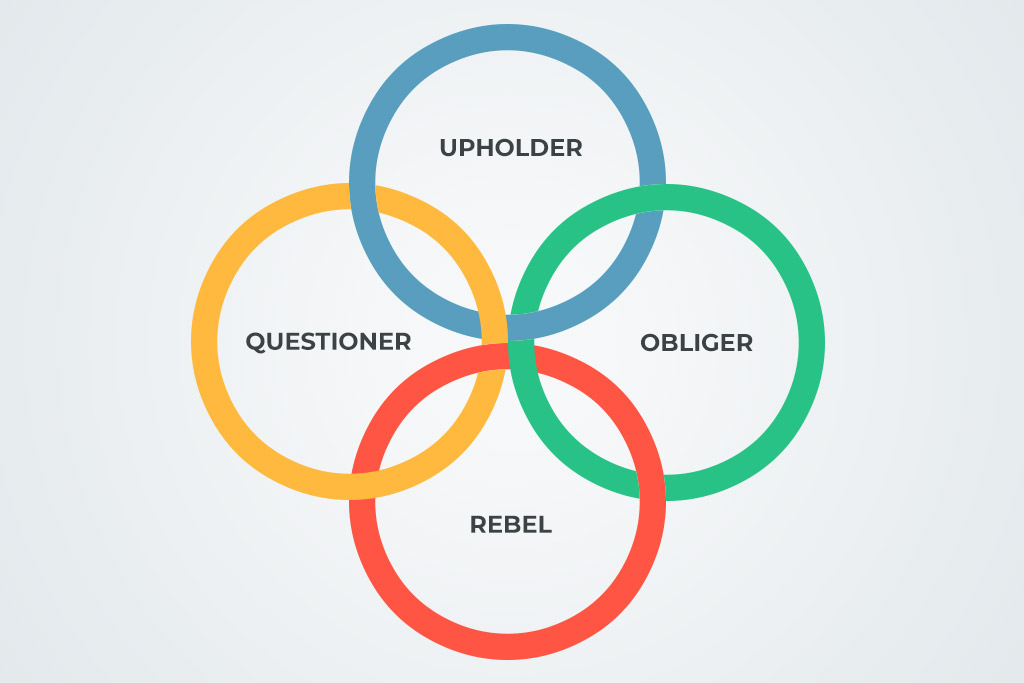You want to write a book. So you sit down at your desk, open your computer, and write it. Right?
Stop laughing.
Or crying, depending on how vast the gap between your good intentions and your word count is.
Maybe you’re one of those rare birds who never finds yourself derailed by competing priorities, insecurities, or procrastination. But if you’re like the rest of us, Gretchen Rubin’s Four Tendencies framework might help you figure out why you have trouble meeting your goals, and how to change that.
People love to classify themselves. If you’ve ever been to a corporate team-building, you’ve probably taken the Myers-Briggs (I’m an INFJ). Maybe you know your Enneagram type (I don’t). You can probably guess which Hogwarts House you’d be sorted into (Ravenclaw). And if you have a teenage daughter who badgers you to take Buzzfeed quizzes, you’ve been categorized in all kinds of ways your firm’s HR director never thought of.
As a writer, I’ve found the Four Tendencies more useful than any other typology because it’s based on how people respond to expectations—like I should finish my novel.
In her bestselling book, The Four Tendencies, Gretchen Rubin divides people into one of four categories based on how they respond to inner (their own) and outer (other people’s) expectations:
- Upholders readily meet both other people’s expectations and their own.
- Obligers are like Upholders in that they readily meet other people’s expectations, but have trouble meeting their own.
- Questioners are the opposite of Obligers, able to meet their own expectations, but tending to resist those imposed from the outside.
- Rebels resist meeting any expectations—their own as well as other people’s.
Since writing is an inner expectation, Upholders and Questioners have an easier time meeting writing goals than Obligers or Rebels. This is especially true of Upholders—conscientious self-starters who like schedules and routines. Though naturally good at setting and meeting goals, Upholders can be rigid, not realizing when something isn’t working and they need to change course.
When Questioners understand the rationale for what they’re doing, they are as focused and goal-oriented as Upholders. But before they accept that rationale, they need data—the more the better. This means they can get bogged down in an endless spiral of research, resulting in analysis paralysis. Books on the craft of writing can help writers, but reading every writing book, article, and website keeps you from actually writing.
Unlike Upholders and Questioners, Obligers struggle to meet the own inner expectations, in part because they are so busy meeting everyone else’s. They have trouble setting boundaries and saying no to other people’s needs so they can pursue their own goals. Rather than trying to change their nature, Obligers need to work with their tendency, creating outer accountability for their inner expectations. For writers, this means accountability partners, a critique group, or a book coach.
Rebels resist both outer and inner expectations. Not only are you not the boss of me—I’m not the boss of me either. Standard productivity advice—schedule tasks, create accountability—backfires for Rebels. The regularly scheduled writing session that is such a comfortable routine for an Upholder or the check-ins with a writers’ group that motivate an Obliger will make a Rebel less likely to write. Rebels will write if they’re clear on why they want to write, and if they can do it when, where, and how it suits them. Being true to their authentic identity is important to Rebels—I’m a writer, and writers write.
Writing Strategies for the Four Tendencies
Upholders:
- Keep doing what’s already working—set goals and work toward them.
- Make a writing schedule, but don’t follow it so slavishly that you get frustrated every time life gets in the way. Writing dates can be rescheduled occasionally when necessary.
- Share your writing goals with others, which increases accountability self and others, both of which encourage Upholders.
- To combat the tendency to rigidity, regularly analyze what’s working and what isn’t, and be open to revising goals and schedules when it’s appropriate.
- Ask others for help when there’s too much on your plate.
Questioners:
- Keep research from turning into procrastination by setting limits on how much time you spend gathering and analyzing data before getting to work.
- Learn to recognize the signs of analysis paralysis and take measures to stop it—set a timer to start work, go for a walk to clear your head, or schedule a time for more analysis later while you get to work now.
- Set goals and track your progress, whether in word count, percent of book finished, or hours spent writing.
- Don’t spend so much time perfecting your tracking system that you never actually get to the writing.
- Figure out when, where, and how often you write best—a routine that works for you, based on your own writing data.
Obligers:
- Instead of telling yourself you should be able to meet writing goals on your own, embrace your tendency and create systems of outer accountability.
- Find a critique partner, ideally another Obliger who needs accountability as much as you do, and support each other by sharing your goals and checking in on progress. Long-distance is no impediment; the critique partner I’ve had the longest is in another country.
- Join a writing group (online or in person) that meets regularly and share your writing goals there.
- If you can afford it, consider working with a book coach for increased accountability.
- Tell your family about your writing goals and let them know you need support and help setting boundaries around your writing time.
Rebels:
- Ignore advice and productivity hacks—they’ll only make you mad.
- Get clear on why you want to write—why it’s important to you, why it’s integral to the person you want to be.
- Don’t set strict routines or schedules. Set a writing goal for the week or month (words, pages, hours as you prefer) and do it when and where and how you want.
- Make a list of writing tasks, but choose which one to do as you see fit.
- Remember that you are a writer, and a writer is someone who writes.
Take the quiz at Gretchen’s website to find your tendency. Note: You have to enter your email to get your results. If this makes you mad, you may be a Rebel. If you keep second-guessing your answer, or take the quiz but think maybe you got the wrong answer and should take it again, you’re probably a Questioner like me.
If you don’t want to take the quiz, ask yourself, Do you make New Year’s resolutions? Then read this to see what your answer says about your tendency.

